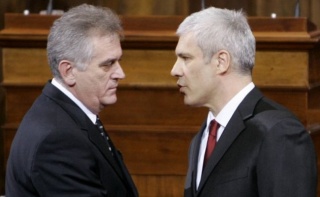23
subota
lipanj
2012
Science, it’s a Common Thing.

Indeed, science is, inter alia, a girl thing. But that should not be advertized in such a cheap way.
The European Commission recently put forward a campaign "Science, It's a Girl Thing" that fosters increase of women in research and innovation. It addresses a gender imbalance in scientific studies and institutions. The campaign's site presents the data which disclose that girls do as well as boys in science and maths at school but many more boys go on to further study science, technology and engineering. It furthermore invigorates girls’ ideas, inspiration and passion into science.
Well, idea is not ungrounded, since there is an evident surplus of interest for humanistic disciplines among youth when it comes to studying in all developed countries. On the top of this, women are lagging behind their male colleagues in laboratories, IT institutions, research centres. Unlike Harvard professor Larry Summers’ scary suggestion put forward back in 2005 on innate differences between males and females that explain why relatively few women become professional scientists or engineers, I believe that girls’ opting for humanities rather for hard science disciplines is socially determined. The choice for feminine-like professions is being cultivated into girls’ minds through socialization and education, both at home and in schools. In churches just as much through media. Therefore, the aim of the campaign is definitely noble, but the means to achieve set ends are completely failed.
What drew my attention to this campaign is a very tacky video clip, a teaser, in which females are presented in stereotypical and indeed discriminatory way. It shows three young women wearing high heels and short skirts, giggling and cat walking while being checked out by a male scientist. One commentary by Carin Bondar describes the video as having “plenty of pink, plenty of makeup, plenty of sexual innuendo”. She asserts that the power of the feminine mystique is not actually used (or accepted) in the scientific environment.
Although one could hardly guess so without knowing its title, the video was aimed at making science appealing to young women but things had not gone as planned. One web site labelled it as “patronising video of the day”. Tim Worstall, contributor in Forbes magazine, asked (like as many others) if this is a missed way of spending taxpayers’ money while the economy of the continent of Europe is falling apart.
Rhitu Chatterjee, who is a science reporter for several renowned media, discussed the video’s impact, claiming such a video can even repel the girls from getting into science:
The video caused a massive dissatisfaction and condemnation of the audience, particularly among female scientists. I, myself, commented in one facebook page that shared the video, disagreeing this should be the way how to attract more females into scientific institutions. Science is not fashion to be promoted in this cheap way, appealing to the basest instincts.
Yesterday I saw the teaser at my friend’s facebook page and shared it at mine, but surprisingly, already today, when I decided to write about the video, I realised it has been removed. However, here it is, I managed to find it. Such a video, selling science in a way that is beyond doubt more suitable for advertisement of a make-up product and as “Sex and the City” trailer, obviously must had caused a furious reaction in the scientific community.
The campaign has it official web site as well as the facebook page. Reactions of the public posted on facebook profile clearly condemn the style and methods pursued.

For example, the lipstick as a marketing symbol of the campaign, which is still part of the project’s facebook page, has been attacked by several people. One of them rightly claim that

Here are couple of other facebook users commented on the disputed commercial:
We need more campaigns about science, but how about something that actually shows its appeal and importance for the whole society, for a change?”
A concrete response video was soon created, ironical video called “The Un-Official response to the Official teaser Science: It's a Girl Thing!”, criticizes the whole EU funded project and the content it has put forward.
Indeed, science is, inter alia, a girl thing. But that should not be advertised in such a cheap way and therefore I am particularly glad the public spur urged the European Commission’s staff to withdraw the video.
komentiraj (0) * ispiši * #
20
srijeda
lipanj
2012
D(r)ugo Selo koje sanjam
Čudno mjesto neko
Živim u administrativnoj jedinici koja se pomalo oksimoronski, neobično svakako, zove grad Dugo Selo. I izgled grada, i količina interakcije i integracije stanovništva koje u njemu živi, i sveopći duh koji vlada u njemu opisuju zgodno riječi jedne dječje pjesmice „ima čudno mjesto neko, malo blizu, pa daleko, malo crno, malo bijelo, malo grad, a malo selo!“
Malo blizu, pa daleko
Dovoljno blizu glavnog grada Zagreba, koji nudi mnoštvo društvenih sadržaja, da stanovništvo ne očekuje od lokalnih vlasti da bi u gradu trebalo osigurati društvene događaje u skladu s potrebama, tehnologijama i ponudom 21. stoljeća. U Dugom Selu nema središnjeg trga, muzeja, prigodne dvorane za koncerte i javna događanja ili kino dvorane, bazena, parkova niti dovoljno suvremeno opremljenih i sigurnih igrališta s obzirom na broj djece koja sa svojim roditeljima žive i odrastaju u našem gradu. Bez obzora što mnogi od dugoselskih stanovnika poslovnim trudom doprinose poduzećima i institucijama u Zagrebu, oni svoje slobodno vrijeme provode u mjestu svoga boravišta i prebivališta. Ne vjerujemo da Dugo Selo treba biti spavaonica u zagrebačkom predgrađu, već osjećamo da među našim sugrađanima ima mnoštvo onih koji su voljni i sposobni svoje stvaralačke potencijale (umne, muzičke, dramske, organizatorske, sportske itd.) dodatno oplemeniti tako što će ih podijeliti sa svojom zajednicom. Osim toga, svaki čovjek u svome životu stvara različite socijalne mreže: svako poznanstvo, a pogotovo prijateljstvo, je bogatstvo i dodatna vrijednost. Stoga sanjam Dugo Selo kao destinaciju iz koje se neće samo odlaziti u Zagreb raditi i kulturno oplemenjivati, nego u koju će dolaziti gosti iz Zagreba i drugih gradova i mjesta. Dugoselci, znani po svojoj dobroj naravi i gostoprimstvu, time će biti obogaćeni za nova iskustva.
Malo crno, malo bijelo
Dugo je Selo, opet zbog svoje neposredne naslonjenosti na Zagreb, mjesto u kojem su soj novi dom našle mnoge izbjeglice u devedesetim godinama prošloga stoljeća, ali i mnogi bivši Zagrepčani koji su zbog jeftinijih životnih troškova i potencijalno veće kvalitete življenja odlučili doseliti u Dugo Selo. No, između dugoselskih starosjedilaca i novo pridošlog dugoselskog stanovništva malo je interakcije. Osim crkava i rijetkih pučkih veselica, rijetka su mjesta na kojima se događa susret različitih kulturnih tradicija i običaja. Urbano Dugo Selo trebalo bi biti ugodno mjesto življenja i razmjene znanja i spoznaja svih ljudi koji u njemu žive. Bez obzira odakle potiču, koje su političkog, vjerskog, etničkog i seksualnog svjetonazora. Samo grad u kojem se svatko osjeća siguran i institucije mu jamče ostvarenje svih njegovih i njenih ljudskih prava može biti grad ugodnog i kvalitetnog življenja. A takvo Dugo selo sanjam.
Malo grad, a malo selo
Smatram da bi grad, kao urbana sredina, trebao svojim stanovnicima nuditi mnoštvo mogućnosti i sadržaja koji ne samo obogaćuju njihov kulturni, društveni i sportski život, nego nude prostore i mogućnosti okupljanja, upoznavanja, dijeljenja ideja, stvaranja prostora za napredak zajednice u kojoj građani i građanke žive, rade i kojoj žele doprinositi. Svjesna sam da izgradnja infrastrukture košta i da za nju gradski oci moraju srednjoročno i dugoročno planirati rashode. Društvena zajednica ima pravo očekivati više od lokalnih političara. Naime, čovjeku, kao društvenom biću, osim hrane i doma, škole i crkve, cesta i kafića, kojima Dugo Selo preobiluje, treba i hrana za dušu i um. Dugo Selo administrativno-pravno grad je tek dvadeset godina. No, u tih dvadeset godina grad još nije odgojio građane koji svoje slobodno vrijeme, energiju i znanje svjesno poklanjaju svoje znanje, entuzijazam i vrijeme kako bi unaprijedili kvalitetu i sadržaj svog životnog prostora i zajednice u kojoj žive. Jer tek takvi stavovi i društvene vrijednosti, jednom kad prevagnu, učinit će Dugo Selo zaista – gradom.
komentiraj (0) * ispiši * #
08
petak
lipanj
2012
Does the new president of Serbia hamper the Western Balkans regional stability?
On May 31, 2012 Tomislav Nikolić was sworn in for a five-year term at an inaugural session of Serbia's new parliament. On June 11, the new president of Serbia will be inaugurated in Belgrade. Unlike to many recent inauguration ceremonies, it seems that regional political establishment will obstruct this one. The reason for such a decision lies in inflammatory and intolerant wording of the newly elected president, which might endanger fragile inter-regional stability and cooperation.
A new President's political biography
Tomislav Nikolić, president of a reformed ultra-nationalist Serbian Progressive Party, won the Serbian presidency second run-off on May 20, 2012. His victory came as a surprise, since majority of political analysts expected a secure victory of a former president Boris Tadić. Until Tadić's defeat, Serbia has been steadily securing European political future. Is this questionable in the future?
Nikolić run four times for the presidency of Serbia since 2000, three times narrowly losing presidential votes. Although Tadić's pro-Western policies resulted in Serbia's EU candidate status his fail is likely linked to voters' discontent with weak economy and corruption within the ruling elite. In addition, Tadić was criticized for not willing to give up his party political leader position, in this way controlling the weak Prime Minister from his Democratic Party. On the other hand, Nikolić's populist platform promised jobs, fight against poverty and corruption. And, immediately after his election as Serbia's new president he formally resigned as the Serbian Progressive Party leader.
Nikolić's political life in the shortest version can be described as chameleonic. Early the 1990s Nikolić joined the ultra-nationalist and nowadays war crime suspect Vojislav Šešelj. Nikolić helped him form the Serbian Chetnik Movement , an ultranationalist group that later merged into the Serbian Radical Party. It is documented that back in early 1990s Nikolić fought as a military volunteer in Croatia together with Šešelj's paramilitary forces. Nikolić and his party were former allies of wartime Serbian leader Milošević. After the Serbian Radical Party formed a coalition with Milošević’s Socialist Party of Serbia in March 1998 Nikolić served as the Deputy Prime Minister of Serbia from and then of FR Yugoslavia. After the Radical Party leader Šešelj voluntarily surrender to the International Criminal Tribunal for the former Yugoslavia in 2003, Nikolić became the deputy leader of the party. Nikolić then insisted in changing party programme from rigidly militant nationalist to one focusing on economic and social issues. In an opportunist manner, Nikolić gave up in 2008 his former political mentor Šešelj, declaing his support for Serbian future within the EU. After splitting with Šešelj, Nikolić then formed the Serbian Progressive Party followed by several Serbian Radical Party MPs. Not that long time ago, in 2007, as the Speaker of Parliament he envisaged Serbia as a Russian province that would be able to "stand up against the hegemony of America and the European Union”. Explaining why Nikolić won and what it might mean for the region Florian Bieber assesses Nikolić's break with his own radical past as „pragmatic, not substantial“.

(c) dnevnik.ba
Adding to the political turmoil in the Balkans
In advance to the elections and shortly after it, Nikolić managed to stir the good neighbourly relations of Serbia and countreis of the region. First, in an interview to the German daily Frankfurter Allgemeine Zeitung he declared that Vukovar was a Serb town and that the Croatians have nothing to do there. To recall, Vukovar is a city in Croatian a border region with Serbia that was fully demolished in 1991 by the Serb paramilitary and Yugoslav army artillery. Such a statement caused a great disappointment and public disapproval in Croatia, making Croatian president Ivo Josipović decide not to attend the inauguration.
Just some days after its elections Nikolić stated that the July 1995 massacre of 8.000 Bosnian Muslim men and boys in the Eastern Bosnian town of Srebrenica was not genocide but the killings amounted to grave war crimes. In that city massive slaughtering of male population took place in a matter of days following outburst of the Serb troops over the UN-protected enclave causing the gravest atrocity in Europe since World War II. The genocidal nature of this terrible event had been confirmed by both the International Criminal Tribunal for the former Yugoslavia (ICTY) and the International Court of Justice. European Commission reacted immediately , declaring it would not tolerate attempts to negate the genocide of Muslims at Srebrenica and strongly rejecting any intention to rewrite history. Acting Chairman of the Presidency of Bosnia and Herzegovina Bakir Izetbegović announced that he will not attend the inauguration.
The newly-elected Serbian president also contested Montenegrin identity in recent days, saying he does recognise Montenegro as an independent country but does not recognise any difference between the Serbs and the Montenegrins. He furthermore expressed his wish to see Serbia and Montenegro develop much better relations in the future than they have done so far because the Serbs and the Montenegrins have much in common. Montenegrin President Filip Vujanović confirmed his intention to attend the Serbian president inauguration.
Finally, this week Nikolić told he would never and under no circumstances recognise Kosovo's independence, even at the cost of cessation of Serbia's EU integration. Needless to say, of course, the President of Kosovo Atifete Jahjaga has not been invited to the inauguration party. Namely, the most troublesome relation Serbia has with neighbouring Kosovo, which declared independence in 2008. Serbian government has refused to recognize independence of its former province since that territory is considered the cradle of Serbia's state and religion. Although Nikolić declared that so far nobody had raised the issue of Belgrade's recognition of Kosovo as a precondition for Serbia's progress in its integration with the European Union, this issue is going to be placed on the negotiations table sooner or later. Unresolved Cypriot question is the ultimate motivator for the EU policy makers to handle the Kosovo issue in advance to Serbia's and Kosovo's accession. Tadić on the other hand fostered conciliatory stance toward neighbourhood that at large experienced aggression to their territories from Serbia throughout 1990s. By doing so he pleased the European Union that made development of good neighbourly relations as a part of pre-accession criteria for the Western Balkans countries.

(c) dnevno.hr
Although Nikolić's public gaffes obviously endanger Serbia's initiated efforts to reconcile with its neighbours, it is unlikely Nikolić as president can significantly slow down Serbia's the European Union accession process. The Serbian president has only limited constitutional authority. The economy and foreign policy are managed by the government. Serbia has been officially a candidate since March this year and the majority of pre-accession work is to be done by the government that will very likely be presided by the former President Tadić. It will be a tough job for Tadić, to a great extent due to the fact that his future coalitional government joints political parties from across the ideological spectre. For example, the Socialist Party of Serbia, the likely minor coalitional partner in the future government, is demanding that the state should start spending money rather than saving it. The third partner in the coalition will very likely be the pro-European Liberal Democratic Party is openly advocating secession of Kosovo. Although the Progressive Party members warn that the new government led by Tadić will lack legitimacy , since the Nikolić’s Progressive Party indeed won the relative majority in May 6 parliamentary elections, Tadić will do his best and utmost to form the government and earn the majority in votes in the Parliament. Namely, an attempt of a cabinet composing for the Democratic Party’s leader Tadić is now a question of political survival that would keep the pro-European image of Serbia.
komentiraj (0) * ispiši * #
